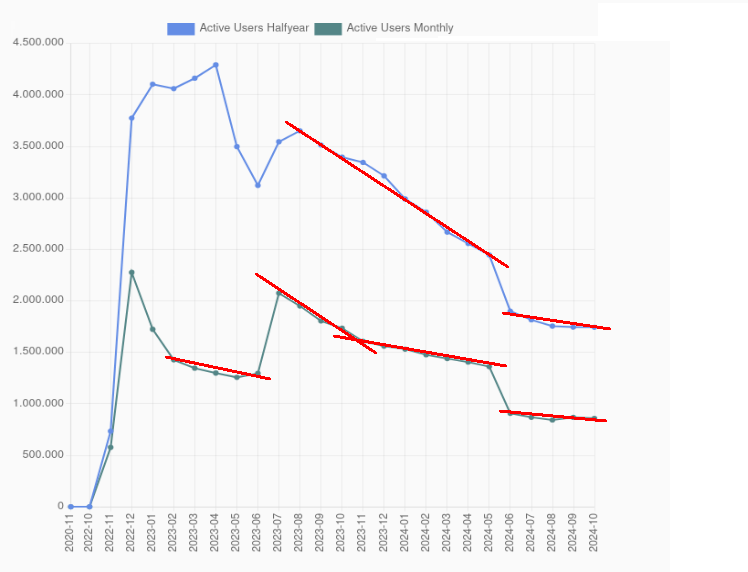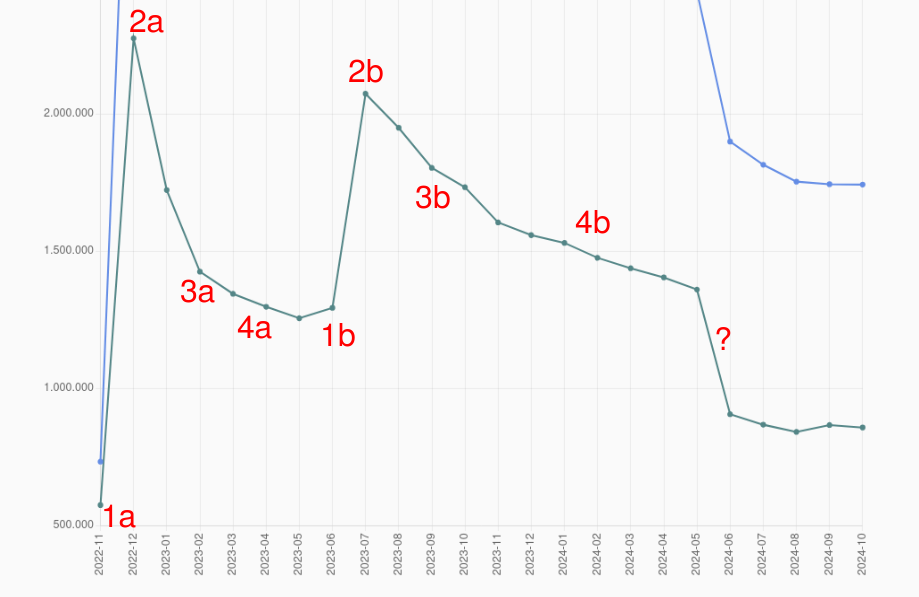I don’t like the clickbait title at all – Mastodon’s clearly going to survive, at least for the forseeable future, and it wouldn’t surprise me if it outlives Xitter.
Still, Mastodon is struggling; most of the people who checkd it out in the November 2022 surge (or the smaller June 2023 surge) didn’t stick around, and numbers have been steadily declining for the last year. The author makes some good points, and some of the comments are excellent.
While I agree with the article and a lot of comments, I am still active on my Mastodon account and I am enjoying it more than ever.
Disclaimer: I’m a white male westerner working in IT. 😉
A friend of mine works in linguistics and education. He was an avid Twitter user and has since migrated to Bluesky and Mastodon. He says, Mastodon is quite complex and clunky but on Bluesky there’s not much happening in his bubble.
For me, the quality of the conversation and the regional character of my local instance is a big plus on Madison. On Lemmy, I read a lot on international and tech topics, but on Mastodon, the conversation is related more to my countries politics and my region.
So, maybe they lost a lot of users. But the 14% that stayed are a good start for quite a vivid community.
If anyone has questions on how to get something out of Mastodon, ask away or follow me here: mateng@nrw.social.
There’s just not many people on there. And I already never used Twitter except to read in-time updates from people and companies, so naturally with many of them being on Threads or Bluesky, that’s where I’d go to get that information.
I mean it’s just normal to have a “social” part to social media, no?
This is a baffling comment. There are tons of people on mastodon, more than I could ever hope to keep up with. I have a couple hundred accounts on follow and never manage to keep up. Honestly it could use some sorting.
I don’t want to follow random people though? Twitter was useful as a way to follow specific companies and people to know when say, a service goes down or an update is released.
These people and companies aren’t on Mastodon.
This is the thing a lot of Mastodon users seem to miss. I was on Twitter because of specific people and companies. They aren’t on Mastodon, so I have no use for it.
There are a lot of companies on the flipboard side, which as far as I know, most servers haven’t defederated
I have a Mastodon account and now on my fourth, fifth instance. I instance hop a lot, which helped me find my people.
I dont agree with a huge chunk of what was said in the post. But I understand where the white people in Bali reference comes from. I am an Asian woman in tech and took me awhile to find people that I can actually connect with. What I like about Mastodon is the fact that I can find niche topics that I wont see in other social media. Also, want to flag that I no longer have accounts in proprietary social media since 2017 which probably helped my drive to find an online community.
In saying so, I have faced some crazy level of stalking (one person only so I guess its isolated?) to the point that this person messaged me on Linkedin and emailed me to tell me I was being impersonated on Mastodon. Because he didnt believe that I am myself??? He went on saying, Hi Miss, I saw youre being impersonated blah blah.
But I also want to mention that I have met so many amazing people through Mastodon.
Its a weird space, but I am weird so I guess I belong there. Loo
There definitely are some great people there. Finding the right instance makes a big difference… unfortunately, almost eerybody starts off on mastodon.social, which for most people isn’t a great choice, and don’t realize they can move – and when they do try to move, they lose their posting history which is annoying.
mastodon + opt in to bridgyfed is the way
@thenexusofprivacy So, I’ve just kinda got a stream of random tidbits here that’ll hopefully sorta surmise my thoughts.
The good:
First off, it’s shrunk but it’s by no means dead. Things grow and shrink and grow again, if it was a straight line with no variation I’d assume it was fake.
Also, Mastodon is not all of activity pub. Threads has brought a lot if people onto the protocol, and while it’s still in development it seems to be intended to work interoperably and the devs said they plan to let people migrate out and take their following/followers with them. I expect this to really supercharge the ecosystem.
The indifferent:
This isn’t 2020 anymore, and there’s more protocols out there. Nostr, in my opinion, is leagues better in the decentralization and user options/customizations department. AT (Bluesky) is leagues better in the end user was of use department. Both of those protocols are also much, much, lighter to host.
Activity pub also has it’s advantages of course. Being the oldest and also being great for communities are two quite big ones.
Some people have chosen to either leave Activity Pub for those protocols, or joined the decentralized ecosystem directly into one of the other two. It’s indifferent, though, because it’s a decentralized ecosystem. All three can chat with each other, so Mastodon & Activity Pub may have shrunk - but the amount of people you can communicate with on them has risen exponentially thanks to bridges.
The ugly:
Federation is a mess. You can have a dozen friends on Activity Pub, a dozen on other protocols connected via bridges or threads and find you can only talk to two or three. That’s a problem; most would give up before understanding why, and many more would likely figure out why and the decide it’s not worth their time working around. After the Bluesky wave I’ve heard Mastodon be called some variation of “bickering fiefs” a couple dozen times.
There’s also some toxicity within the space. Most people I’ve interacted with have been great, but it still rears it’s head now and then. You can get nearly bullied off the platform if you suggest people be nice to Windows users. It was kinda funny to see that blog post shortly after I jokingly said “you guys would probably put a hit out on me if I said I was using Windows” in a similar thread. In a similar vein, while accessibility is great, I’d bet more people have left the protocol after being yelled at for not using alt text then there are users who rely on alt text.
My predictions:
I’d bet that all three protocols grow a lot in the future and that more platforms start integrating one or more of the three big protocols. It’s a cheat code for new platforms to automatically have a bunch of content, and it’s free platform software already built. Federation issues and fediverse specific toxicity issues will potentially be eternal septembered away. Most people won’t care what OS you use and will want to be able to talk to their friends as apposed to having current federation. There might be a small splinter group of the older crowd using opt-in federation, but most of the ecosystem will change if it grows.
I’d also bet the three big protocols will continue to get closer. All three can already communicate, and heck, I, as an incompitant programmer, made a quick script that lets any Nostr client communicate with Mastodon &/or Bluesky. Throw some compitant devs at it and soon enough you probably won’t even be able to tell at first glance what protocol the other person you’re communicating with is on. Bluesky and Nostr in the mix bring Mastodon’s ~800k monthly active users to like ~15 million. A more connected ecosystem make things better for everyone.
Re blue sky, is anyone actually federating with it? I don’t know of any other instances besides the official one.
@ColonelThirtyTwo Sorta/mostly. The protocol has a bit of a different model then Activity Pub, and it’s in development so there are some limitations, but it’s been opened and there’s people hosting their own PDSs now (the part of Bluesky that hosts your account).
To my knowledge there’s only two AT relays (the part that aggregates content from PDSs), Bluesky itself and very recently frontpage (a link aggregator). That makes the network fairly centralized right now, although BlueSky/AT has made a lot of progress in the last 9 months in terms of opening up so I expect it’ll be a lot less centralized this time next year. I’m also betting that somebody will make an AT client that pulls posts directly from PDSs instead of going through a relay at some point.
Yeah, right now the way I think of it is that Bluesky is (conceptualy) a single big instance, connected to the rest of the ActivityPub fediverse via Bridgy Fed (which speaks both AT and ActivityPub). Bluesky’s decentralized in a different way, and the broader ATmosphere (apps that use AT protocol) is growing as well, but it deosn’t really have the same concept of instance.
Yes but no. Due to architectural differences, federation under AuthTransfer protocol is simply different compared to ActivityPub. In its own terms it is federated as individuals’ data is stored in personal data servers (PDSs) connected to a relay, which currently is only the Bluesky relay, that roughly speaking connects them to other personal data servers.
You can technically operate your own personal data server apart from those operated by Bluesky, but I think it’s fair to say the vast majority on there don’t. It’s not clear yet, apart from fully holding your own data, how useful it is to operate your own given you only have one relay to use anyway at the moment.
So even in its own terms Bluesky really isn’t federated in much of a meaningful sense yet. The problems are twofold: a major part of their pitch is making federation Just Work™, keeping the underlying tech out of mind to mitigate confusion, but you can’t have your cake and eat it too here. Eventually, if you’re really committed to meaningful federation, you have to teach people about the value of operating their own personal data servers, at minimum, otherwise what was the point in separating it out in the architecture?
Problem is, that goes against their pitch to their audience and spoils the appeal. It’s telling a good joke only to kill it by explaining to the one person that went, “I don’t get it.”
Secondly, they’ve already upfront said that relays may be cost prohibitive for many people to operate, resulting in only a few ever being spun up. If that remains the case and is true, then even if a few were spun up, that’s not any more federated or distributed than the rather consolidated web we see now. How much of a difference would it make if the social web was running on AuthTransfer and the major relays were owned and run by Meta/Facebook, Twitter/X, and Google?
Congrats you have your own data in a personal data server…But are you really the one running it, or did you just opt into the PDS entryway offered by Facebook/Twitter/Google/etc. because sorry, what’s that about a server?
Do you mind linking your script?
@dameoutlaw Sure
Readme is overdue to actually be finished, but the script itself is working. Can be run locally on desktop or termux, though some clients on desktop need a custom host added since they don’t like localhost and amethyst only uses it if you don’t add it as a local relay.
Good points! Agreed very much about all protocols growing, and that the ActivityPub fediverse is broader than just Mastodon.
I agree with top comment.
I’m Indonesian. Most of trending fediverse are Western related topics which It’s not relevant to me.
There’s one time when I randomly post about my country politics, and people on Mastodon just assume or comment using Western mindset.
Other than this Lemmy account, I mostly stick with hobby-related fediverse that mostly East Asian and Southeast Asian people.
Also, Indonesian is currently the highest user on Twitter, recently bypassed Brazil. People still use it as our local feed is… well localized. No Western-related discussion and much more comfy.
That was a great comment. It’s frustrating because the fediverse should be good at making it easy for people to find topics their interested in … but it doesn’t work out that way in practice.
i have a mastodon account but it’s completely useless for me.
the only thing i use twitter for is to follow updates and news from professional journalists and artists who are not on mastodon and likely will never be. if your job depends on twitter, switching to mastodon is not going to happen.
if i want to engage with random average people, i come here to lemmy.
Uff, imagine getting news from a rightwing nutjob owned social network. Big yikes.
sports news, get off your high horse.
Sure, blue checkmark.
you are everything that’s wrong with the internet.
No u
I think a better title & question would be, “Why is Mastodon struggling to thrive?”
It’s surviving no problem, but it’s not thriving for a multitude of reasons. Some are pretty well covered across comments here & in the linked discussion, and are more or less reiterations of prior discussions on the matter.
Ultimately I think as much as many of those reasons are correct, the biggest reason is the same as ever: network effects. All the jank and technical details could be endured and adjusted to if there was sufficient value to be had in doing so, i.e. following accounts of interest/entertainment, connecting with friends, etc. That’s proven to varying degrees by those that have stuck with Mastodon. In turn, however, it’s also clear by how many bounce off that for many there’s still insufficient value to be found across Mastodon instances to justify dealing with all the rough edges.
If Mastodon had enough broadly appealing/interesting people/accounts across its instances, people might deal with the various technical and cultural rough spots the same way they deal with similar on other social networks they may complain about yet won’t leave. There still aren’t enough of those sorts on there for many though, so Mastodon simply survives but doesn’t thrive.
Agreed, that would have been a much better title. There’s a lot of negativity around Mastodon – the Twitter migration in 2022 is often described as a “failure”. It certainly wasn’t a success, but I see it much more as a missed opportunity.
Network effects are certainly a big deal but every social network has to deal with the issue, and some succeed. Addressing some of the reasons for bouncing not only improves retention, but makes it more likely that people recommend it to their friends. So many of the problems from July 2023’s Mastodon Is Easy and Fun Except When It Isn’t were problems back in 2017 as well … how much progress has Mastodon made? Fortunately other fediverse software’s making more progress, but it’s still frustrating.
Because no one is on it. I don’t do twitter/facebook-like social media to interact exclusively with random people. I have no family or friends on Mastodon and couldn’t tell you if any “content creators,” for the lack of a better term, that I follow elsewhere are on it to follow.
I think because when it comes to Instagram or Twitter type social media more people probably use it only to follow accounts and have no interest in being involved in it. So closer to treating it like a rss reader than something like lemmy or reddit. And conversation feed sucks in general.
I use squawker for Twitter. Can’t comment, like, sub, or whatever and account follows are just local feeds like Stealth for Reddit or NewPipe or Freetube. And that’s all I need from it.
Both Intsagram and Twitter will fill your feed with random people / brands you don’t follow.
It’s all about the dopamine hit.
Not with squawker for Twitter. Displays only people you follow and in chronological order. There’s no recommendations or ads.
When you say “people…”, assume that most use the native app.
Regular people likely care more about being able to follow who they follow than ads, which they are more likely to put up with even for basic browsing. Last bit was just how I use it.
I’m just saying, that they are really, really inefficient as RSS for everyday people since the are more posts you didn’t subscribe to, than the ones you subscribed to.
Hence saying that it’s what people use them for IMO , genedally, is incorrect.
Mastodon is just like Threads : a hype , wait for the hype to end and you’ll see that it doesn’t offer something that would impress an ordinary person who isn’t a nerd or tech savvy enough to continue using it… What I’ll say now is more like random thoughts about federation and it applies to any federated service but this post inspired my thoughts so …
The two best features I can think of for a Mastodon are :
- Open source: an excellent thing but it’s probably not important for an ordinary person who still uses the products of big companies just because they are “convenient” and “common” even when his data is the cost
- federated: although it provides freedom to choose where you want to join, it creates a lot of confusion and inconvenience as well : I personally have somewhat specific interests and I usually tend to avoid public instances dedicated to “everything”, however, every time I decided to join a federated service I got the same confusion : “which instance should I choose?” , I had two accounts on Mastodon before I deleted one of them ( and I’ll probably delete the other soon ) and I felt this confusion the two times I created an account, I have two accounts on Lemmy and I felt this confusion the two times I created an account, one account on Peertube and it’s the same ( this was the most difficult of them honestly because Peertube’s filters are very bad and whenever I could find an instance that I considered good, it turns out that registration is closed, or needs approval), the same confusion also happened when I created an account on Kbin/Mbin , the same on Pixelfeed , the same when I searched for an instance of friendica and it will be the same when I think in the future to repeat the experience on any other federated service… Now, someone may come and say the famous sentence “it doesn’t matter which instance you choose, at the end you can follow anything from any instance” and honestly this sentence is a pure myth imho because … first : when you register an account in an instance, you will constantly notice the “local” section, which shows you what’s happening on the instance you are in , and it’ll form part of your experience in the instance depending on the instance itself and people on this instance , also , let’s suppose that a large number of annoying users existed on a popular instance and the moderation of this instance couldn’t solve the problem ( or didn’t do anything about this in the first place) , what might happen is that moderation of other instances might decide to defederate with this instance, and this might affect an ordinary user who has done nothing but joined the instance - and any other person who isn’t annoying but but ended up on this instance -, I know that this point is unreal currently but it might be real one day especially that some instances are known for not being tolerated with specific behaviors
- Another confusion that might happen … I’ll explain it with my own experience : when I was still using my first Mastodon account, I left the account for a few months and then decided to return … but guess what happened ? I forgot which instance I signed up for in the first place ! fortunately, after two attempts in two different instances, I found the solution : I searched on a random instance for my Account (I still remember the username ) and was able to find it … I was lucky in this, but I can’t guarantee that everyone will be as lucky as me and will find a way to remember ( this is both a good and bad point for the federation , on the one hand I forgot where I registered because the instances are similar , and on the other hand I found the instance which I registered in using another instance )
TL;DR
Federation is not something familiar or comfortable for an average normal person
Until you explain email is federation.
In the imaginary world where Gmail required you to visit Outlook to view the entire thread because it hadn’t synced yet, yeah sure they’re exactly the same. In the real world the email comparison stops being useful beyond explaining how @ monikers work.
I don’t think I’ve had that problem?
@chottomatte federation should be an as invisible as impossible for the fediverse to be mainstream imo
I don’t see the point. It’s like twitter. Never saw the point of that either instead of lemmy or Reddit honestly
I’ll say it again, the name sucks. It’s not cute, it sounds like mastrubate compared to twitter, it just is not catchy.
TicTic, snapchat, the apps that make it have a stupid catchy name, mastadon ain’t it.
i think maybe because it has 3 syllables
Better name than X.
I do kind of like that they call messages “toots.” That’s my kind of stupid.
Twitter really isn’t that much better. I remember when Twitter first started and it was getting a lot of crap for its weird name and that you made tweets. It count on eventually, but it’s going to take constant exposure.
I like my toots.
Mastodon wasn’t launched by a VC-backed Silicon Valley startup to become the phone app that replaces Twitter.
It was created by a German high school graduate and metalhead all alone as not much more than StatusNet with a different UI and some features cut for simplicity. It was designed by a nerd for nerds, nerds who didn’t rely on phone apps for everything. At this level, and back in 2016, not even an official native iPhone app was mandatory.
Maybe rebrand as Y
I thought this was about the band and panicked
Let’s see:
Network effect hits Mastodon specially hard as it competes not just with Twitter, but also Threads and Bluesky. In those situations, a smaller userbase means that people will outright ignore you as an option.
The way that federation was implemented; as linearchaos mentioned in another thread, if you settle in a smaller instance (the “right” thing to do), you won’t get “good collections of off node traffic”. So it creates a situation where, if you know how federation works you’ll avoid big instances, and worsen your own experience; and if you don’t, well, Mastodon’s big selling point goes down the drain.
Federation itself introduces a complexity cost. That’s unavoidable and the benefits of federation outweigh the cost by far; however, the cost is concrete while the bigger benefit is far more abstract.
Branding issues. Other users already mentioned it, but you don’t sell a novel tech named after an extinct animal.
And this is just conjecture from my part, but I think that microblogging is becoming less popular than it used to be; people who like short content would rather go watch a TikTok video, and people who want well-thought content already would rather read a “proper” blog instead.
On a lighter side: the very fact that we’re using the ActivityPub now helps Mastodon, even if we’re in different platforms (like Lemmy, MBin, PieFed, SubLinks). Due to how federation works, you’re bound to see someone in Mastodon sharing content with those forums and vice versa; it could be a bit less clunky but it’s still more content for both sides.
On the text: I think that the author reached the right conclusion through the wrong reasoning. The activity peaks don’t matter that much, when there’s a huge influx of users you’re bound to see some leaving five minutes later. The reason why Mastodon is struggling is this:

See those slopes down? They show that the stable userbase is shrinking. Even users engaged enough with the platform are slowly leaving, but newbies who could fill their place aren’t popping up.
you don’t sell a novel tech named after an extinct animal
They didn’t, Mastodon is named after the metal band (which is named after the extinct animal) 🙂
Either way, back in 2008 I bet people were making fun of Twitter for being named after bird sounds, so.
I wasn’t aware of the connection with the band - thanks for the info! Still, people are bound to associate “mastodon” first and foremost with the critter.
Either way, back in 2008 I bet people were making fun of Twitter for being named after bird sounds, so.
I don’t remember but you’re likely correct. There’s a difference though - Twitter didn’t need to capitalise on every single tiny advantage, Mastodon does it, and while the role of branding might be small it still gives you (or your competitors) some edge.
They created a name clash with the band on purpose? Because they’re fans? That’s rich.
“He”, not “they” — if I understand correctly this was way back when Eugene Rochko was the sole developer — but yes. Same as Lemmy being named after Lemmy Kilmister, and Debian major versions after Toy story characters.
I don’t see what’s “rich” about that, it’s just developers having personal tastes outside of coding.
Exactly copying a name is a bit strange to me. I have always been under impression that whoever named the social network has been unaware of the band.
Lemmy and Debian are not the same.
Half the users of the initial peek are still active?
Doesn’t sound too bad if there would be events that bring new users from time to time.
Yeah, the peaks themselves and the quick (~2m) drop after them are not the big deal. The big deal is to slowly bleed users. It’s really problematic in the long term; by no means “MASTADON IS DOOMED!”, but more like “Mastodon, you need to step your game up.”
I disagree with your and the author’s conclusions.
I have made my own long comment about it in thread, so here I am going to focus on your chart.
First, I will accept the data of the chart at face value, it seems resonably accurate and I don’t have any other data to work off of.
My point is that you are interpreting it wrong.
To me the declining slopes after the sruges are not relevant to any long term conclusions, they follow a highly predictable curve and doesn’t mean much.
If you look at the end of the graphs you can even see it growing slightly, that is obviously not evidence of anything yet, but to me it is an indication of either a start of another surge, or stability.
I believe you are too quick at spreading doom for Mastodon, give it half a year and look at the stats then, we won’t see a meteoric rise of active users any time soon, just accept it and work with more realistic expectations.
First, I will accept the data of the chart at face value, it seems resonably accurate and I don’t have any other data to work off of.
If you do find another source of data, please post it. Relying on a single source (like the Fediverse Observer) is problematic, I know.
To me the declining slopes after the sruges are not relevant to any long term conclusions, they follow a highly predictable curve and doesn’t mean much.
You’re conflating the sharp drops after the surges with the declining slopes.
The sharp drops (like MAU from 12/2022 to 02/2023) go as you said, they don’t mean much. However, the declining slopes are relevant - they span across multiple months (up to ten), and show that Mastodon userbase has a consistent tendency to shrink.
If you look at the end of the graphs you can even see it growing slightly, that is obviously not evidence of anything yet, but to me it is an indication of either a start of another surge, or stability.
We’ll only know if it’s an indication of a surge (sudden influx of new users), or growth (slow influx), or stability in the future. For now it’s an isolated data point.
I believe you are too quick at spreading doom for Mastodon
I’m saying that Mastodon is struggling. I did not say that Mastodon is doomed.
The difference is important here because a struggling network can be still saved, while a doomed one can’t.
The slopes you meassure are still tied to the preceeding surges, so I can’t treat them as any indication of success/failure.
To me it kinda looks like we are in the trough of disillusionment, which is a normal period of any new tech/system.
With improvements to the network we soon hit the slope of enlightenment.
Context for other users - the user above is likely referring to the Gartner cycle:

As anyone here can see, it looks nothing like that pattern that I’ve highlighted.
If the success condition for Mastodon is “to become a long-term viable and attractive alternative to corporate-owned microblogging”, then improvements of the platform are necessary.
To be clear on my opinion in this matter: I want to see Mastodon to succeed, I want to see X and Threads closing down, and IDGAF about Bluesky. However I’m not too eager to engage in wishful belief and pretend that everything is fine - because acknowledging the problem is always the first step to solve it.
You are absolutely right that I am refering to the Gartner cycle.
It doesn’t fit exactly, but the general pattern fit very well with the first half.
The Mastodon graph just happens to have two hype sections.
A model that explains well half of the data is as useful as a coin toss. But let’s roll with it, and pretend that we got two superimposed Gartner cycles here.
The trough would be reached after a sharp drop after the peak, and based on the first peak it would be ~2 months long. That would explain only the period between 2023-07 and 2023-09; the rest of what I’ve pointed out in red is clearly something else, the nearest of what they look like would be a sick version of the “slope of enlightenment” - going down instead of up.

Yeah, the model doesn’t work.
A better way to approach this is to consider three things:
- The main selling point is federation.
- Federation is only perceived as useful for your typical user when a competitor abuses power.
- Mastodon has the drawbacks already mentioned all the time, not just when the competitors fuck it up.
Once you notice those things, it gets really easy to explain what’s happening:
- the peaks are caused by Musk’s acquisition of Reddit and Threads being released (as it brought a lot of discussion about federation up)
- overexcitable people take 1~2 months to realise that Mastodon is not just “Twitter minus Musk”.
- the drawbacks are always there, so Mastodon slowly bleeds users, while only gathering new ones when Musk/Zuckenberg/etc. do something shitty.
By analysing the data this way, not just we’re describing it better, but we can also see where Mastodon needs to improve:
- It needs killer features that are clearly visible for everyone, regardless of federation or “Musk pissed off users”
- It needs to be promoted better. Even among non-Twitter/Bluesky/Threads users.
- Federation itself needs to be promoted better, with simple words, showing why leaving Twitter for yet another walled garden won’t solve shite in the long run.
What I’m saying also partially applies to the “Fediverse link aggregators”, like Lemmy. Lemmy does show some tendency to bleed users, but in smaller degree than Mastodon; but it’s in a better position because there’s only one big competitor, and it keeps fucking it up over and over.



















